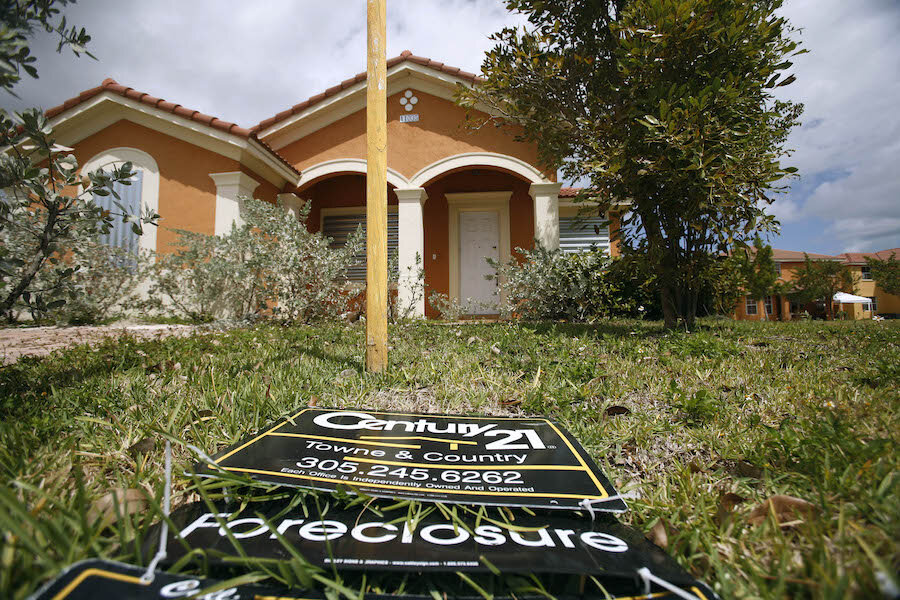Is buying a foreclosed home ever a good idea?
Loading...
Foreclosures are falling across the country. Real estate site RealtyTrac reports that the number of homes in foreclosure dropped 3% in 2015 compared to the previous year. But while foreclosure activity is dropping in most major cities, there are some metropolises where foreclosed properties still account for too large of a percentage of homes on the market.
Here's the question for home buyers: Do high-foreclosure markets actually represent an opportunity? Do these cities give buyers a chance to get into city neighborhoods that they otherwise might not be able to afford?
Yes, they do. But buyers have to be careful: Purchasing a home that is in foreclosure can lead to big problems.
Foreclosure Numbers
RealtyTrac said that at the end of 2015, 1.08 million U.S. properties had foreclosure filings on them. These filings include default notices, scheduled auctions, and bank repossessions. This figure is down 3% from the end of 2014.
Even more impressive, it's down nearly 62% from 2010. That year saw 2.87 million U.S. properties with foreclosure filings on them — an all-time high.
But five U.S. cities in particular are still struggling with too many foreclosures. RealtyTrac reported that as of the end of 2015, 3.43% of the housing units in the Atlantic City, NJ housing market had foreclosure filings. That's the highest percent of any the major U.S. markets that RealtyTrac charts.
Other cities in the top five, according to RealtyTrac, are Trenton, NJ, with 2.14% of its housing stock having foreclosure filings; the Tampa Bay-St. Petersburg-Clearwater metropolitan area of Florida with a foreclosure rate of 2.03%; Jacksonville, FL, at 2.02%; and Miami, FL, at 1.98%.
Opportunities for Investors
Foreclosures are bad news for neighborhoods. That's because they tend to bring down the sales prices of the homes surrounding them, even those residences not in foreclosure.
Say a neighborhood has several foreclosure homes that are selling for less than market value. This makes life difficult for other sellers. Sellers listing their homes at $200,000 will struggle to get that listing price if their neighborhood also features eight similar homes that are in foreclosure and all selling near $150,000.
The buyers, looking for bargains, will make offers on those homes first. Other sellers can either lower their asking prices to compete more effectively with the foreclosures, or wait out the wave of local foreclosures in the hopes of nabbing a sales price closer to their actual list price.
But while foreclosures might be a burden for sellers, they do present opportunities for buyers. A lower-priced foreclosure could help buyers find homes in neighborhoods that they otherwise couldn't afford.
But buying foreclosures can also come with big headaches, mostly because these homes are often in terrible condition.
Foreclosure Traps to Avoid
You'll find the lowest prices for foreclosed homes by buying them at auction. But the auction process is also the riskiest way to buy foreclosures. That's because you won't have the chance to inspect a foreclosed home beforehand.
Once you get your "bargain" home, you might find that it needs costly repairs that can quickly eat up the savings you thought you'd enjoy. A foreclosed home purchased through auction might also have liens filed against it, such as liens for outstanding tax payments. You might be on the hook for those unpaid taxes, and need to reach a settlement with the IRS.
A safer choice is to buy homes that are owned by a bank. These properties, often referred to as REO or real-estate owned homes, have already been through the foreclosure process, with banks having taken them over. Banks will often sell these homes at prices below market value to get rid of them.
The best news for buyers is that banks are required to pay off any liens filed against these properties. Buyers can also hire home inspectors to tour the homes before they buy them. These inspectors can help buyers determine how much they'll need to spend in repairs. Buyers can then calculate whether a particular foreclosure is a bargain or a potential money pit.
A foreclosed home can present a savvy investment opportunity under the right circumstances. Do your homework, and you might just come away with a diamond in the rough.
This article first appeared in Wise Bread.





